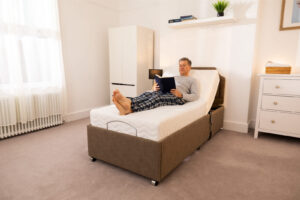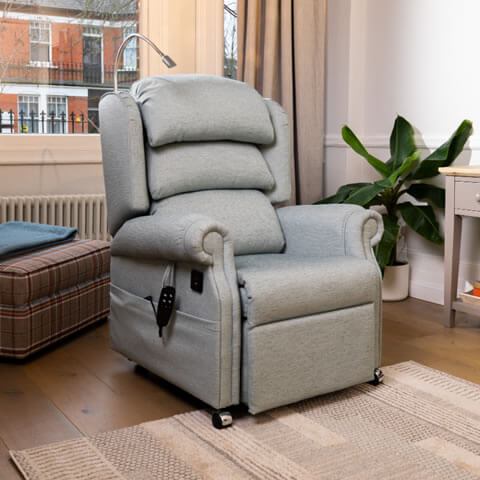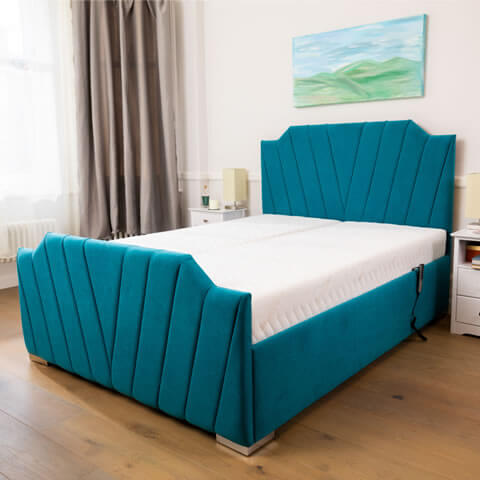How to Help Someone Sleep Better
Sleep plays a vital role in our overall wellbeing, especially as we get older. A good night’s rest helps the body repair, supports memory and focus, and maintains a healthy immune system. If an elderly loved one is struggling to sleep, small changes can make a big difference.
This guide explores how to help someone sleep better by creating the right environment, encouraging healthy habits, and recognising when health issues may be to blame.
How Much Sleep Do We Need?
Sleep needs vary from person to person, but most adults require between seven and nine hours a night. As we age, the quality of sleep often changes. Older adults might sleep less deeply or wake more frequently during the night.
Even though total sleep time may reduce slightly, it’s still important to get enough restful hours. Poor sleep can lead to fatigue, low mood, confusion, and increased risk of falls.
What Causes an Elderly Person Not to Sleep?
There are several common reasons why an elderly person may find it hard to sleep. As bodies age over the years, the following changes can impact sleep:
- Changes in sleep cycles: As we age, our internal body clock shifts, causing earlier bedtimes and wake times.
- Pain or discomfort: Conditions such as arthritis or back pain can make lying down difficult.
- Health issues: Problems like indigestion or sciatica can cause nighttime discomfort and disrupt rest.
- Medication side effects: Some prescriptions can cause insomnia or vivid dreams.
- Anxiety or loneliness: Emotional wellbeing has a strong impact on sleep quality.

How to Help A Loved One Sleep Better
Once you understand what’s affecting your loved one’s sleep, you can make supportive changes to their daily routine and sleeping space.
Curate a Healthy Sleep Environment
A comfortable, calm bedroom sets the tone for better rest. Begin by reducing noise and light where possible. Soft, dim lighting encourages the brain to produce melatonin, the hormone that signals it’s time to sleep.
Temperature also plays a big role. A slightly cooler room helps the body maintain its natural sleep rhythm. Bedding should feel light and breathable, allowing for easy movement during the night.
Consider soothing, neutral décor too. Simple changes like choosing the right bedroom colours can help, with shades like blue and lavender promoting calm and relaxation.
Introduce an Adjustable Bed
An adjustable bed can be a life-changing investment for anyone struggling to get comfortable at night. By raising or lowering different sections of the bed, you can relieve pressure points and support the body’s natural alignment.
Adjustable beds are particularly helpful for people with mobility challenges, joint pain, or circulation issues. They make it easier to get in and out of bed, reducing strain on muscles and joints.
Research also shows that a slight elevation can help with snoring, indigestion, sciatica and back pain. Choosing the right mattress for their needs and preferences can go a long way in helping someone get a good night’s sleep, too.
Encourage Routine and Exercise
Encouraging a consistent sleep routine can help regulate the body’s internal clock. Try to keep regular wake and bedtime hours, even on weekends.
Gentle daily exercise also promotes deeper, more restorative sleep. Activities like walking, stretching, or light gardening can reduce tension and improve mood. Just avoid intense activity close to bedtime, as it can make falling asleep harder.
Daily Engagement and Stimulation
Mental and social stimulation during the day helps prevent restlessness at night. Encourage your loved one to read, complete puzzles, pick up hobbies or spend time with friends and family.
Staying engaged during the day helps balance energy levels and keeps the mind active. Even small activities, such as a chat over a cup of tea or time outdoors, can make bedtime more restful.
Help Monitor their Diet
What we eat and drink plays a large role in how well we sleep. When caring for an elderly relative or friend, monitoring their diet can help them maintain good health and improve their sleep. Try to limit caffeine and alcohol intake, especially in the evening, and encourage lighter meals before bed to avoid indigestion.
Foods rich in magnesium and tryptophan, like bananas, oats, and milk, can promote better sleep naturally. Hydration is also important, but try to reduce drinks just before bedtime to avoid frequent trips to the bathroom.
Try an Adjustable Bed with a Free Home Trial
Supporting a loved one’s sleep takes patience and understanding. Small, consistent changes can greatly improve rest, mood, and overall wellbeing.
If you think an adjustable bed could help, Grosvenor Mobility offers a free home trial so you can explore the comfort and benefits first-hand. Our specialists will bring the bed to your home, set it up, and answer any questions you may have!

Riser Recliner Chairs
We believe everyone deserves the freedom to relax in complete comfort and independence at home. That’s why we proudly offer a premium range of riser recliner chairs and adjustable beds, designed to support your lifestyle and make everyday living comfortable again.

Adjustable Beds
The bedroom is your sanctuary. It’s your place to rest, unwind and totally relax. But to do so, you need the perfect adjustable bed; comfortable and luxurious. At Grosvenor Mobility our range of electric mobility recliner beds do just that. Featuring easy-to-use handsets that operate our ultra-quiet motors allowing you complete control at the touch of a button.




